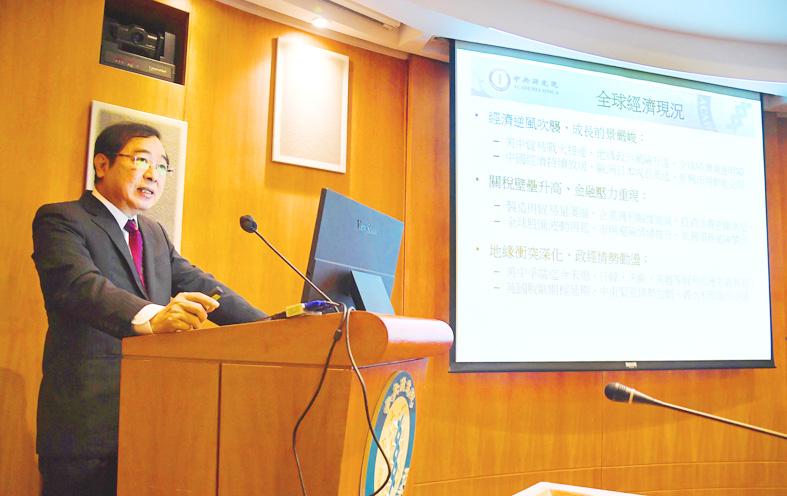The consumer price index (CPI) next year would rise above the 2 percent alert, and not decelerate as other institutes have forecast, because producers and retailers would pass mounting cost burdens on to customers, Academia Sinica said yesterday.
The inflationary gauge would be 2.04 percent next year, compared with 2.01 percent this year, as companies would boost selling prices to reflect rising costs, with the spillover effect extending to end consumers, Academia Sinica research fellow Ray Chou (周雨田) told an online news conference.
Academia Sinica is the only economic research institute in Taiwan to have forecast domestic inflation of more than 2 percent next year.

Photo: CNA
Persistently high wholesale price index readings support the view, Chou said, adding that other institutes fail to factor in housing price hikes, which would help drive up rent.
“Supply chain bottlenecks would linger and deteriorate, heaping inflation pressures on goods amid the rapid spread of virus infections caused by the Omicron variant” of SARS-CoV-2, Chou said.
Countries around the world have tightened border controls and bolstered disease containment measures as cases escalate and threaten medical capacity, he said.
Taiwanese policymakers continue to paint above-par CPI readings as transient and attributable to a low comparison base last year, he said.
They insist that things will normalize next year, even though the US Federal Reserve and the Bank of England have recognized that inflation merits monetary policy responses, he said.
Academia Sinica said that increasing home prices and payrolls would prompt landlords to raise rents.
Directorate-General of Budget, Accounting and Statistics (DGBAS) data have already showed upticks in rent rates in the past few months, it said.
A survey by Evertrust Rehouse Co (永慶房屋) found that house prices nationwide picked up by double percentage digits this quarter.
Developers have said they have to adjust prices to reflect spikes in labor, building material and land costs, while tile producer Champion Building Materials Co (冠軍建材) on Tuesday said that it would increase its prices by 8 to 15 percent.
Several restaurants and hotels, as well as manufacturers, have said that they had to take similar steps to remain profitable.
A CPI of more than 2 percent would not be all bad news, as it would foster economic expansion, Chou said.
A CPI growth figure near 1 percent would raise concerns about deflation, he said.
If the world can quickly gain control over Omicron outbreaks, uncertainty would subside, he said.
Academia Sinica projected that GDP growth would moderate to 3.85 percent next year, from an estimated 6.04 percent this year, due to a high comparison base this year.
The 3.85 percent projection is a conservative estimate compared with the 4.15 percent forecast by the DGBAS and the central bank’s 4.03 percent, while the latest GDP growth forecasts by major domestic think tanks were all above 4 percent.
Additional reporting by CNA

OPTIMISTIC: The DGBAS sharply upgraded its GDP growth estimate from 3.54 percent to 7.71 percent after the Taiwan-US trade agreement signing and given AI optimism The US imported more from Taiwan than China for the first time in decades, as US President Donald Trump’s tariffs reshape trade flows while a global boom in artificial intelligence (AI) fuels demand for tech products. US purchases of goods from China plunged almost 44 percent in December last year from 2024 to US$21.1 billion, US Department of Commerce data showed on Thursday. By contrast, shipments from Taiwan more than doubled during the same period to US$24.7 billion. The soaring Taiwanese shipments to the US reflect the huge expansion in supplies of chips and servers for AI companies, which has completely changed

NON-NEGOTIABLE: The US president’s action ran counter to one of the US’ ‘six assurances’ on not consulting China about arms sales to Taiwan, US lawmakers said US President Donald Trump’s admission that he is discussing arms sales to Taiwan with Chinese President Xi Jinping (習近平) is “alarming and a blatant violation of US policy and the six assurances,” US Representative Ro Khanna said on Tuesday. Trump on Monday said he would decide soon on whether to send more weapons to Taiwan, after Xi warned him not to do so. “I’m talking to him about it. We had a good conversation, and we’ll make a determination pretty soon,” Trump told reporters aboard Air Force One when asked about warnings raised by Beijing during a phone call with Xi over

The Central Election Commission has amended election and recall regulations to require elected office candidates to provide proof that they have no Chinese citizenship, a Cabinet report said. The commission on Oct. 29 last year revised the Measures for the Permission of Family-based Residence, Long-term Residence and Settlement of People from the Mainland Area in the Taiwan Area (大陸地區人民在台灣地區依親居留長期居留或定居許可辦法), the Executive Yuan said in a report it submitted to the legislature for review. The revision requires Chinese citizens applying for permanent residency to submit notarial documents showing that they have lost their Chinese household record and have renounced — or have never

US and Chinese fighter jets briefly faced off above waters near the Korean Peninsula this week, Yonhap News agency reported, marking a rare confrontation in that area between the two superpowers. About 10 US fighter jets on Wednesday departed an airbase in Pyeongtaek, South Korea, for drills above international waters off South Korea’s western coast, the news outlet cited unidentified military sources as saying. While the US planes did not enter China’s air defense identification zone, Beijing scrambled planes as they neared that region, the report said. “The Chinese People’s Liberation Army organized naval and air forces to monitor and effectively respond